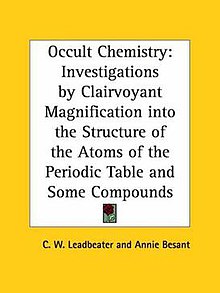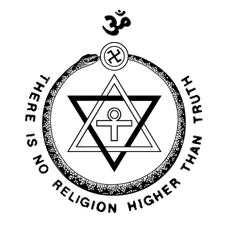Occult Chemistry
 | |
| Author | Annie Besant C.W. Leadbeater |
|---|---|
| Publisher | Theosophical Publishing House Adyar |
Publication date | 1908 |
| Media type | Hardback |
| Pages | 92+22 |
| ISBN | 1-56459-678-8 |
| OCLC | 77847789 |

Occult Chemistry: Investigations by Clairvoyant Magnification into the Structure of the Atoms of the Periodic Table and Some Compounds (originally subtitled A Series of Clairvoyant Observations on the Chemical Elements) is a book written by Annie Besant and C.W. Leadbeater, who were both members of the Theosophical Society based in Adyar, India. Besant was at the time the President of the Society having succeeded Henry Olcott after his death in 1907.
Overview
[edit]The first edition reprinting articles from The Theosophist was published in 1908, followed by a second edition edited by Alfred Percy Sinnett in 1919, and a third edition edited by Curuppumullage Jinarajadasa in 1951.[1][2]
Since the first edition was published in 1908, the book is in the public domain, and available in whole or in excerpts, on many sites on the internet.[3]
Occult Chemistry states that the structure of chemical elements can be assessed through clairvoyant observation with the microscopic vision of the third eye.[4] Observations were carried out between 1895 and 1933. "The book consists both of coordinated and illustrated descriptions of presumed etheric counterparts of the atoms of the then known chemical elements, and of other expositions of occult physics."[5]
Critical reception
[edit]Academic criticism is available in Chapter 2 of Modern Alchemy: Occultism and the Emergence of Atomic Theory,[6] and in an online article from the Chemistry department at Yale University.[7]
Critics regard the book to be an example of pseudoscience.[8] According to Philip Ball, most scientists did not take the book seriously.[9]
See also
[edit]References
[edit]- ^ Brock, William H. (14 December 2016). William Crookes (1832–1919) and the Commercialization of Science. Taylor & Francis. pp. 464–465. ISBN 978-1-351-87286-7.
- ^ List of Sources - Occult Chemistry for Postgraduate Students of Physics, Philosophy & Psychology
- ^ Occult Chemistry by Annie Wood Besant and C. W. Leadbeater at Project Gutenberg
- ^ It was claimed by C.W. Leadbeater that, by extending an "etheric tube" from the third eye, it is possible for one to develop microscopic vision and telescopic vision. See Leadbeater, C.W. The Chakras Wheaton, Illinois, USA:1927 Theosophical Publishing House Page 79
- ^ An Appreciation of C.W. Leadbeater, by Geoffrey Hodson
- ^ Morrisson, Mark (19 April 2007). "2: Occult Chemistry, Instrumentation, and the Theosophical Science of Direct Perception". Modern Alchemy: Occultism and the Emergence of Atomic Theory. Oxford University Press. pp. 65–96. ISBN 978-0-19-804192-4.
- ^ McBride, J. Michael (12 May 1999). "Serious Scientific Lessons from Direct Observation of Atoms through Clairvoyance". Chemistry 125. New Haven, CT: Yale University. Archived from the original on 24 July 2010. Retrieved 6 March 2017.
- ^ Gardner, Martin. (2001). Did Adam and Eve Have Navels?: Debunking Pseudoscience. W. W. Norton & Company. p. 62. ISBN 978-0393322385
- ^ Ball, Philip. (2015). Invisible: The Dangerous Allure of the Unseen. University of Chicago Press. pp. 121-124. ISBN 978-0226238890
| Part of a series on |
| Theosophy |
|---|
 |
Further reading
[edit]- Besant, Annie; Leadbeater, Charles. (1919 edition). Occult Chemistry: Clairvoyant Observations On the Chemical Elements. Theosophical Publishing House.
- Morrisson, Mark. (2007). Modern Alchemy: Occultism and the Emergence of Atomic Theory. Oxford University Press.
- Phillips, Stephen. (1980). Extrasensory Perception of Quarks. Theosophical Publishing House. ISBN 978-0-8356-0227-3
- Tompkins, Peter (June 1997). The Secret Life of Nature: Living in Harmony With the Hidden World of Nature Spirits from Fairies to Quarks. Harperone. ISBN 0-06-250847-4.
